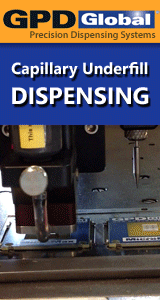Jun 26, 2006 (See Comments Below) Editorial
Managing the Naughty Child
Mike Martel, Editor, Circuitnet I've been listening to voices on both sides of the RoHS issue and the more I hear, the more foreboding the tone becomes. Despite what some writers have suggested to me, i.e., don't fight it, get with the program - I think the electronics manufacturing industry has a real mess on its hands that will only grow in complexity as new lead-free assemblies age in the field. The ultimate outcome, as one friend commented the other day at lunch, will probably be the granting of so many exemptions - necessary ones - that the whole experiment in going lead-free will have proven to be a many-headed hydra, a RoHarce farce that will ultimately spawn more problems than its short-sighted authors could ever have hoped to solve. Somehow I recall the old proverb that the Road to Hell is paved with Good Intentions.
The implications of the impending RoHS-inspired process and reliability quagmire came to me in hints and whispers - actually, whiskers, the tin kind - a year ago when I was looking into efforts and studies that iNEMI was involved in regarding mitigating tin whisker growth.
Tin Whiskers. Source: Circuits Assembly Magazine Tin is a problematic, spooky metal, and I suppose that the electronics industry would be glad to get rid of it if only there were a suitable or economically feasible replacement. It does strange things - such as turn to powder at very cold temperatures, grow whiskers, etc., and while I am neither metallurgist nor scientist in any qualification, I do understand that tin, like a naughty child, can be governed when paired with its strict nanny, lead. Right now I hear that the most popular tin/lead replacement alloys, SAC-alloys, unfortunately have problems with tin whiskering, but even worse than that, they are prone to serious voiding problems that may compromise the integrity of the soldered connections.
One solder paste supplier, Cobar BV, appears to have addressed the voiding problem with one specific SAC alloy. Since we recognize that voids don't come from the alloy itself but must be related to the flux, Cobar, which has been working for a long time in the development of high heat tolerant synthetic fluxes, focused on the purity of the synthetic materials and claims to have a void-free formula that is currently producing millions of joints in consumer electronic products for a major European maker.
That being said, we still must look to the tin whisker issue. Being the neophyte that I am, I recently queried Harvey Miller, who appears to have (vociferously) taken up the standard of the Anti-RoHS Rebels, is the use of conformal coating might, in some cases, particular with the tougher coatings, prevent the growth of tin whiskers. Thinking myself a little clever to have asked, I was nonetheless horrified to receive a response through Harvey from a colleague of his, a Mr. John Burke:
"It is proven that conformal coating does nothing to stop tin whiskers. It will push through the coating and will be deflected by the next coating it comes to, so it is kind of OK in that respect unless you have a whisker coming from the other direction. It does nothing for whiskers under the coating, since they will propagate regardless."
Like little hypodermics, yes? I would not have expected it, so I suspect that as whiskers grow, they grow, like an asparagus, from the base, pushing upward and away. Harvey writes further:
"When I asked Carol Handwerker if silver could stop tin whisker formation, she replied "only lead". (Carol Handwerker is Professor of Materials Engineering at Purdue University, and the former chief of the Metallurgy Division at NIST and moderator of the first iNEMI Tin Whisker Workshop). I'm sure the process can be ameliorated one way or other but not reliably stopped. Kirkendall voids are more insidious because copper will diffuse into tin w/o lead, leaving voids behind. Drop your cell phone and open circuits result. We could go on."
"The present Environmental Commissioner at the EU Parliament is Stavros Dimas from Greece. I suspect he would like to get rid of the lead ban. He wrote someone that he is aware of how much additional energy it will waste because of higher temperatures. But reversing is not that easy when so many egos and so much money have been invested in lead-free. So it will take some time, but it will be reversed."
Now that's optimism. Let's see how it plays out.
Mike Martel, Editor Circuitnet
reply »
![]() Jun 26, 2006 (See Comments Below)
Editorial
Managing ...
- Sep 26, 2006
by
Patrick Bruneel
Jun 26, 2006 (See Comments Below)
Editorial
Managing ...
- Sep 26, 2006
by
Patrick Bruneel
![]()







